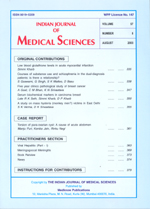
|
Indian Journal of Medical Sciences
Medknow Publications on behalf of Indian Journal of Medical Sciences Trust
ISSN: 0019-5359 EISSN: 1998-3654
Vol. 57, Num. 12, 2003, pp. 559-560
|
Indian Journal of Medical Sciences, Volume 57, Number 12, December 2003, pp. 559-560
Venlafaxine Withdrawal in Organic Anxiety Disorder
O P Jhirwal, S Chakrabarti
Department of Psychiatry, Post Graduate Institute of Medical, Education and Research, Chandigarh - 160012, India. E-mail: drjhirwalop@yahoo.co.in
Code Number: ms03048
Sir
Antidepressants with a dual action of inhibiting the reuptake of nor- adrenaline and serotonin e.g. venlafaxine, may be more effective in anxiety disorders, than drugs acting on a single monoamine.1 However, because of its short half-life there is an increased risk of withdrawal symptoms on stoppage of venlafaxine. This is a report of a woman with organic anxiety disorder who developed withdrawal symptoms after discontinuation of venlafaxine.
A 35 year-old Sikh housewife was referred to the psychiatry outpatient clinic from endocrinology where she had presented with anxiety, palpitations, restlessness, fine tremors, excessive sweating, increased frequency of bowel movements, significant weight loss, easy fatigability and pain in the neck (thyroid region) for the past 1 year. These complaints were associated with significant socio-occupational dysfunction. She was treated with venlafaxine 75mg/day by a private physician for 4 months, with which she had partial relief. Endocrinologists carried out routine tests and thyroid functions that revealed high levels of T3 and T4 with decreased TSH concentrations. The diagnosis of lymphocytic thyroiditis made confirmation by Fine Needle Aspiration Cytology. She put on carbimazole and referred to psychiatry for assessment of anxiety symptoms. Detailed evaluation in our
Department revealed close temporal correlation of anxiety symptoms with symptoms of hyperthyroidism and having no background history of anxiety, and no psychosocial stressors. A diagnosis of organic anxiety disorder2 was made. She was continued on venlafaxine with dose being increased to 150 mg/day, in addition to the antithyroid drug. Thyroid functions normalized after twelve weeks of starting carbimazole, after which the endocrinologist withdrew the carbimazole. Thyroid status remained normal following this.
Since anxiety symptoms resolved after patient regained euthyroid status, it was decided to taper off venlafaxine after 16 weeks of treatment. Venlafaxine was reduced to 37.5 mg b.i.d. and then to 18.75 mg b.i.d. over a period of 20 days. About 24 hours after venlafaxine was discontinued, the patient had diffuse headache, dizziness, a sinking sensation, urinary frequency, abdominal distress and nausea. Her blood pressure and heart rate were normal. The symptoms completely resolved within 2-3 hours after venlafaxine (18.75mg b.i.d.) was re-initiated. Following this, withdrawal was attempted on four to five occasions every 1-2 week. Whenever the daily venlafaxine dose would be reduced below 18.75 mg b.i.d., the same symptoms recurred for 24 hours and again remitted upon resumption of the medication. Venlafaxine treatment was thus discontinued very gradually over a 10-week period. Neither did her symptoms of anxiety, nor did the withdrawal symptoms reappear after this.
This woman developed withdrawal symptoms following venlafaxine discontinuation. She had significant gastrointestinal and central nervous system symptoms, which were not a part of her original presentation. They emerged within 24 hours after drug discontinuation, or dose reduction, and remitted almost immediately after re-introduction of the drug. A similar clinical picture has been previously reported in cases of venlafaxine withdrawal, abrupt discontinuation may also lead to psychosis or delirium.3-4 The profile of symptoms suggests that either serotonin or nor- epinephrine, or both, may be involved in withdrawal reactions.
This case was unusual in having an organic anxiety disorder as all previous reports are among depressed patients. Further, it is recommended that venlafaxine be withdrawn slowly over 1-4 weeks.5 However, this case also highlights the need for a more gradual taper of venlafaxine in certain patients.
REFERENCES
1. Beaudair L, Radio-Andraour D, Chouinard G Selecting serotonin-noradrenaline reuptake inhibitors. In: Sadock BJ, Sadock VA, editors. Comprehensive Textbook of Psychiatry. Philadelphia PA: Lippincott, Williams & Wilkins; 2000. Vol. II. pp. 2427-32.
2. World Health Organization. The ICD-10 Classification of Mental and Behavioral Disorders: Clinical descriptions and diagnostic guidelines Geneva: World Health Organization; 1992.
3. Fava M, Mulroy R, Alpert J, Nierenberg AA, Rosenbaum JF. Emergence of adverse events following discontinuation of treatment with extended-release Venlafaxine. Am J Psychiatry 1997;154:1760-2.
4. Pinzani V, Ginies E, Robert L, Peyriere H, Abbar M, Blayar JP. Venlafaxine withdrawal syndrome: report of six cases and review of the literature. Rev Med Interne 2000;21:282-4.
5. Louie AK, Lannon RA, Virsch MA, Lewis TB. Venlafaxine withdrawal reactions (letter). Am J Psychiatry 1996;153:1652.
Copyright 2003 - Indian Journal of Medical Sciences.
|
